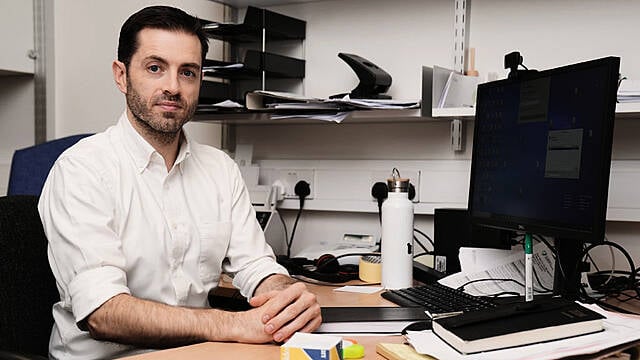The College of Psychiatrists of Ireland has warned of “perilous” resourcing for eating disorder treatment as it called for the complete implementation of an HSE model of care from six years ago which has yet to be fully realised.
Dr Art Malone, a consultant psychiatrist with specialty in eating disorders, said the severe physical and psychological consequences of untreated eating disorders can be devastating and life-threatening, as well as significantly damaging to social and occupational wellbeing.
Eating disorders, including anorexia nervosa, bulimia nervosa, and binge eating disorder, affect people across all demographics.
Data from almost 10 years ago estimated that nearly 200,000 people in Ireland will develop an eating disorder during their lifetime, with Dr Malone predicting this figure has risen with the increasing population and the growth in the severity of disorders.
According to the Health Research Board, 25 per cent of under-18 admissions to Irish hospitals in 2023 were for eating disorders.
The 2018 HSE plan envisaged the formation of 16 specialist teams, 23 specialist adult inpatient beds, and eight inpatient beds for children and adolescents.
However, the college said there are only three adult eating disorder inpatient beds in the entire country – the same as in 2018.
It added that many people, depending on where they live in Ireland, have no access to specialist treatment and may be forced to travel abroad.
While some new specialist teams have been created, the college says these have often been understaffed, under-resourced and underfunded.
Asked where the blackspots were, Dr Malone, co-chairman of the eating disorder special interest group of the College of Psychiatrists of Ireland, said: “It’s all blackspots.”
He said prioritising outpatient care in every area is a noble goal, but does not identify the people at the most severe end who need inpatient treatment.
He added: “There’s a group of people that are uncounted – and we don’t know how many – that really would benefit from this type of treatment but have completely been unable to.”
He said the implementation of the HSE’s 2018 plan has fallen short of its targets and left patients and their families suffering.
Speaking to the PA news agency at St Vincent’s University Hospital in Dublin, he said it was “essential” that every area of the country had an outpatient specialist team, as well as regional access to inpatient beds for those with the most severe need.
He acknowledged the growth in outpatient services, but added: “That’s great, but it’s been a priority to get outpatient services at the, kind of, neglect of how there’s the same three inpatient beds available now that were available 20 years ago, and that has not changed.”
He said any delay in accessing specialist care can also erode patient trust and create a more difficult path for treatment.
One of Dr Malone patient’s, who we are calling Sophie for her privacy, has been in and out of several child and adult services for eight years.
Sophie, now 21, was first sent to St Vincent’s under a court order. She said: “For people lucky enough to get the treatment when the need it, it can be life-changing.”
She added: “I probably wouldn’t be here at all if I hadn’t gotten the treatment when I did get it, because of the pretty critical state that I was in.”
Dr Malone said Sophie’s story highlights the need for specialist teams that can manage the vulnerable transition periods that patients experience when they enter and leave inpatient and outpatient care.
He said she has gained skills and strength after being “knocked off her trajectory”, adding: “Once Sophie started working with us, once she started trusting us, once she was able to be aware of how little she’d likely to be manage at home, once the court order actually finished when the acute medical risk’s gone away, she actually had enough experience to say ‘I can work with you here’ and continue working with us.”
Sophie agrees. She said, in her experience, non-specialised treatment centres “don’t get it at all”, and would attempt to give medication for symptoms of depression and anxiety rather than managing the entirety of her eating disorder.
“In practically every admission that I’ve had prior to (St Vincent’s), they didn’t really know where to even start.”
She said of one regional healthcare setting she had experience before getting access to the specialist team: “I just seemed to be getting worse while I was in there because they didn’t have the resources or expertise to help me manage the emotional side and physical side of weight gain-weight loss.
“But here, it was just a completely opposite experience. There was constantly someone who understood where my emotions were at, who was available to calm me down during those times, and help me manage meals and snacks.”
In particular, she was comforted by the feeling of assurance that she was not going to be “left” after being an inpatient: “This was like, ‘we’ll get you able to live a life’ rather than just scrape to survive.”
Sophie hopes to return to education after her experience with an eating disorder interrupted her path to university.
The College of Psychiatrists of Ireland is calling for the full implementation of the HSE model of care for eating disorders, including the funding and recruitment of teams in areas with no current service and provision of day-programme services throughout the country.
It wants improved ability for mental health services to recruit essential staff and for a reviewed national strategy for inpatient care for adults, identifying plausible sites for such services.
The HSE said its core focus is on developing regional community-based specialist eating disorder services, with 11 national clinical teams in place. It says eating disorder care remains a priority recruitment area and that the model of care is “due for review”.
It added that a review of adult bed capacity for specialist eating disorders beds is under way, including HSE usage of private placements and treatment abroad.
The Department of Health said it was “firmly committed” to enhancing specialist services for eating disorders, including improved access and shorter waiting lists.
Sophie added: “Even if I had stayed just not quite completely ‘critical’ and kept that for years on end, I wouldn’t be able to do anything the same.
“I couldn’t enjoy anything, I couldn’t laugh, I couldn’t be happy and like anything.
“So the fact that I can even enjoy things now, have energy… I grew up dancing and swimming, and it’s only since coming out of inpatient (care) and slowly going back to those things that I always knew I loved, but they just mean so much more to me now.

“It has given me a chance to find more about like the good side of life, what life can be.”
Sophie also hoped policymakers could consider more the needs of people with eating disorders when introducing new regulations or designing services.
She acknowledges she is “lucky” to live in an area where a specialist team operates, adding: “It’s not fair that there’s so many people that can’t get the help that they desperately need.”







